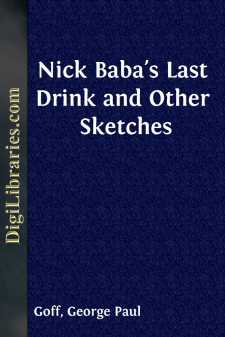Categories
- Antiques & Collectibles 13
- Architecture 36
- Art 48
- Bibles 22
- Biography & Autobiography 813
- Body, Mind & Spirit 142
- Business & Economics 28
- Children's Books 17
- Children's Fiction 14
- Computers 4
- Cooking 94
- Crafts & Hobbies 4
- Drama 346
- Education 46
- Family & Relationships 57
- Fiction 11829
- Games 19
- Gardening 17
- Health & Fitness 34
- History 1377
- House & Home 1
- Humor 147
- Juvenile Fiction 1873
- Juvenile Nonfiction 202
- Language Arts & Disciplines 88
- Law 16
- Literary Collections 686
- Literary Criticism 179
- Mathematics 13
- Medical 41
- Music 40
- Nature 179
- Non-Classifiable 1768
- Performing Arts 7
- Periodicals 1453
- Philosophy 64
- Photography 2
- Poetry 896
- Political Science 203
- Psychology 42
- Reference 154
- Religion 513
- Science 126
- Self-Help 84
- Social Science 81
- Sports & Recreation 34
- Study Aids 3
- Technology & Engineering 59
- Transportation 23
- Travel 463
- True Crime 29
Nick Baba's Last Drink and Other Sketches
by: George Paul Goff
Categories:
Description:
Excerpt
NICK BABA'S LAST DRINK.
t was Christmas Eve, and the one narrow main street of a small country town was ablaze. Extra lights were glowing in all the little shops; yet all this illumination served only to make more apparent the untidy condition of the six-by-nine window panes, as well as the goods therein. Men and women were hastening homeward with well-filled baskets which they had provided for the festive morrow. All the ragged, dirty urchins of the village were gathered about the dingy shop windows admiring, with distended eyes and gaping mouths, the several displays of toys and sweetmeats.
Their arms buried quite to their elbows in capacious but empty pockets, they cast longing looks and wondered, as they had no stockings, where Santa Claus could put their presents when he had brought them. To all this show and preparation there was one exception: one place shrouded in total darkness—it was the shop of Nick Baba, the village shoemaker. That was for the time deserted; left to its dust, its collection of worn-out soles, its curtains of cobwebs, and its compound of bad, unwholesome odors. This darkness and neglect was about to end, however, and give place to a glimmer of light.
Nick now came hurrying in and, quickly striking a light, placed between himself and a flickering oil lamp a small glass globe filled with water. He sat down upon his bench and commenced work in earnest on an unfinished pair of shoes. He hammered, and pulled, and stretched, and pegged, and sewed, and all this time, had there been any one present, they might have observed that, though Nick worked so diligently, he was unhappy, and a prey to the bitterest reflections. All in the village had commenced their merry-making, while he sat there alone, forgotten, and in despair. His neighbors had plenty—he was penniless, and could take nothing to his home but regrets for the past. The rickety old door now creaked on its rusty, worn-out hinges, and admitted a creature as strange looking as it was unexpected. It moved straight toward Nick, and perched itself upon a three-legged stool close beside him. This mysterious thing could not be pronounced supernatural, and yet it was as unlike anything human as is possible to imagine. It was more like some fantastic figure seen in a dream—the creation of a disordered brain. It may be that it was a goblin—Nick thought it one. It was only about two feet high; a mass of dark-brown hair streamed down its back, partially concealing a great hump, and thence flowed down to its heels. Its head was round as a ball and topped out by a velvet cap of curious shape and workmanship, with a broad projecting front which shaded a pair of lustrous red eyes, set far back beneath the forehead—almost lost there. Its breast was sunken, and the head settled down between the shoulders, created an impression of weakness, as if, for example, it should speak, that a small piping voice would come struggling up from below. Baba looked up with alarm, but the goblin greeted him with a smile, and said, "Merry Christmas, Nick," in a deep, strong and not unmusical voice, which came boldly up and out from its parted lips.
"How do you know my name?" inquired the cobbler, "and why do you mock me by such a greeting?"
"Baba, my friend," replied the Goblin, "I was just thinking that if all the acts of your life had been as good and as humane as your mechanical skill is perfect, you would not now be floundering in the meshes of vice and dissipation. You are making a good pair of shoes there."
The shoemaker worked away without raising his head, but responded spitefully, "Where is the use of making them good?—I get no pay for them."
"Why, who," inquired the occupant of the three-legged stool, "is so ungenerous as to want such shoes without paying for them?"
"They are," answered the busy workman, "for the owner of this miserable shanty, and he complains because I am only six months behind with my rent—a most unreasonable man....


